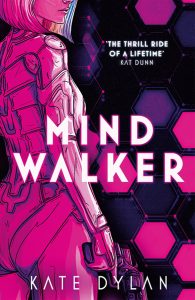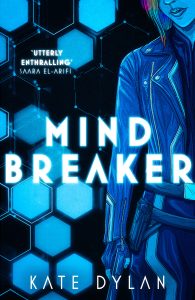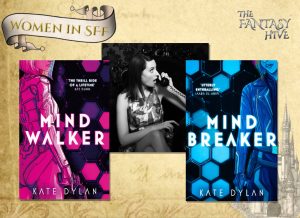Interview with Kate Dylan (MINDWALKER)
Kate is a video editor by day, science fiction and fantasy author by night. Her passion for writing YA novels is fuelled by a love of banter, snark, and all things Marvel, and is supported by her long-suffering boyfriend and their thoroughly indifferent cat.
You can find her across social media (Twitter/IG/TT): @TheKateDylan
And for more info on her or her books, head to: katedylanbooks.com or linktr.ee/katedylan
Welcome to the Hive, Kate. Let’s start with the basics: tell us about Mindwalker – why should readers check it out?
Mindwalker is an action-packed thriller about a girl with a supercomputer in her head who can take over other people’s minds. It’s Blade Runner meets all your favourite YA books from the dystopian era (think The Hunger Games and Divergent) and I designed it to read like a Marvel movie—so readers can expect a ton of fun and cool tech, but there’s also a few big themes buried beneath the banter, such as consent and the dangers of corporate greed.
Give us an insight into your characters, who can we expect to meet? Do you have a favourite child?
Building off the Marvel comparison, I usually describe the main character in the book (Sil) as Black Widow-esque. She’s hyper competent, but also naïve, and brainwashed to high hell by the corporation she works for. Oh, and she’s got about a year left to live at the start of the book—so the stakes basically start at eleven.
The story explores her friendship with fellow Mindwalkers, Lena and Jondi—who are both also nearing their expiration dates—as well as the anti-corp rebels Sil meets along the way: the enigmatic (and deeply attractive) leader of the Analog Army, Ryder, and a pair of badass sapphic hackers called Aja and Brin.
Each of the gang has a little piece of me in them (though they are way more competent than I am) so they were all a blast to write.

Tell us a little something about your writing process – do you have a certain method? Do you find music helps? Give us a glimpse into your world!
God, I wish. I am pure chaos, all the way down. A discovery writer to the end—which is . . . hard when you’re writing something as plot heavy as Mindwalker. But that’s just how my brain works. I sit down to write (I try to get out at least 200-300 words a day) and my brain just makes connections in the story in a way that never fails to surprise—and terrify—me. So I can’t plan ahead because until my brain is ready to make those connections, I can’t really see the plot. It’s a method that hasn’t failed me yet, but boy do I spend a lot of time worrying that one day, my brain is just going to nope out and go skiing.
And no—I’m not a music girl! My ipod (you know I’m not a music girl because I still say ipod) is stuck on My Chemical Romance circa 2008. I’m also a monster in that I write with the TV on. The more dialogue heavy the show, the better!
Speaking of worlds, what inspires your worldbuilding? Do you have a magic system/s? If so, can you tell us a bit about it?
Mindwalker is heavily inspired by the sci-fi I watched as a kid—so movies like Ghost in the Shell and Blade Runner (Mindwalker has big Blade Runner vibes. Lots of neons), and shows like Dark Angel, Dollhouse, and Westworld. It’s the kind of sci-fi world I refer to as ‘TV sci-fi’ in that it’s not about the science or the tech—those just exist to serve the story, which is why I often call Mindwalker a gateway sci-fi. It’s written to be super accessible, with the tech introduced to the reader the same way a magic system would be in a fantasy novel.
Sil’s ‘power’ in the book is to Mindwalk—which basically means jumping into other people’s heads and controlling them like puppets. So, you know, not horrifying or morally questionable at all.
If you were transported into your own fictional world, how do you think you would fare?
Oddly enough, I think I would have a great time! I mean, the world is literally filled with tech I would absolutely kill for: mods that allow you to change your appearance, holoparks, food synthesizers . . . so long as I stay under the corporations’ radar, I’d be just fine.
Or I’d wake up one day being driven like a human meat puppet by a Mindwalker. It could go either way.
We see such varying opinions from authors when it comes to the time of editing their books. How have you found the editing process? Enjoyable, stressful or satisfying?
I actually prefer editing to drafting! Pure creation is terrifying for me—largely because of the infuriating way in which my brain just makes things click in its own good, mystical time. Usually, by the time I’m 60% into the draft, I’m itching to go back and fix all the things I know are broken.
That said, every part of the process is stressful under deadline—especially since I’m not the fastest writer. It’s a running joke among my writer friends (and probably all writers) that the worst part of writing a book is whatever part you’re currently on.

We always appreciate a beautiful book cover! How involved in the process were you? Was there a particular aesthetic you hoped the artist would portray?
Very involved. Probably much more involved than my publisher expected (or wanted) me to be. I’m a video editor by day, so visuals are my specialty, and let’s just say I have many opinions (and absolutely no filter to stop me expressing them). But I got incredibly lucky to have a team that kept my wishes in mind and worked tirelessly to give me a cover I absolutely adore.
It was an interesting process because there’s not that much YA sci-fi out there (comparatively), so we weren’t tied to market trends in the same way a fantasy novel might be. Though my editor opened our first chat about the cover with the word ‘cyberpunk’, so I instantly knew we were on a similar page direction wise. The team then spent a while looking for the right illustrator, and Andrew Davis truly was the perfect choice.
And for those wondering—yes, it was always pink. Right from the first set of concepts. I remember getting an early email that said something like: we really feel like the pink will make it stand out—almost like my editor was trying to sell me on it.
But I did not need selling. The pink was a stroke of genius.
Just for fun, how would you pitch your book as a 1-star review?
“This whole book is just a rip-off of Elon Musk’s Neuralink brain implant—1 star”
Though let the record show, I beat him to it 😉
Can you tell us anything about any upcoming projects? Or can you tell us a few teasers for your sequel, Mindbreaker?
I can’t say much about my upcoming projects just yet, other than that they’re letting me write more books, and that my current wip is a fantasy project.
And as for teasers for Mindbreaker . . .
If Mindwalker is my Black Widow novel, then Mindbreaker is Hulk smash. Indra is what happens when you give someone a lot of power, but no instructions for how to use it, so as you can imagine, chaos ensues.
Who are the most significant women in SFF who have shaped and influenced your work?
I think the writers who had the most significant influence on my work are the ones I was reading when I just started feeling the urge to write (which was, admittedly, not until I was 26), so Veronica Roth, Lauren James, Victoria Aveyard, Suzanne Collins . . . theirs were the voices that shaped my writing the most, and gave rise to my love of hyper-voicey first person.
I wish I had discovered Tahereh Mafi back then as well (instead of coming later to the Shatter Me series via TikTok) because her prose is so interesting.
Who is a great woman in SFF who we should be reading? Any hidden gems?
In YA sci-fi specifically (and I have to take this opportunity to plug YA sci-fi), there are so many fantastic women flying under the radar. If you like your sci-fi sweeter and full of heart, read some Alechia Dow. If Mindwalker leaves you wanting more cyberpunk, Claire Winn has a fantastic (and sapphic!) duology. Meg Long has two amazing books out for those who like their sci-fi grounded in character. For giant mechas: Zoe Hana Mikuta and Andrea Tang. And if you like a little more science in your books, then Emily Suvada is a must read.
Finally, what is the one thing you hope readers take away from your writing?
This might sound odd from someone who wrote a book about consent (not exactly a light topic . . .) but the most important thing to me is that my readers have fun while reading my stories. I wrote Mindwalker to capture the exhilaration I felt watching my favourite movies. If I can invoke that feeling in a reader, then I’ve done my job right.
Thank you so much for joining us for Women in SFF!
Mindwalker is available now, and Mindbreaker is due for publication 14th September.
Follow the Bookshop.org links below to order your copies:

